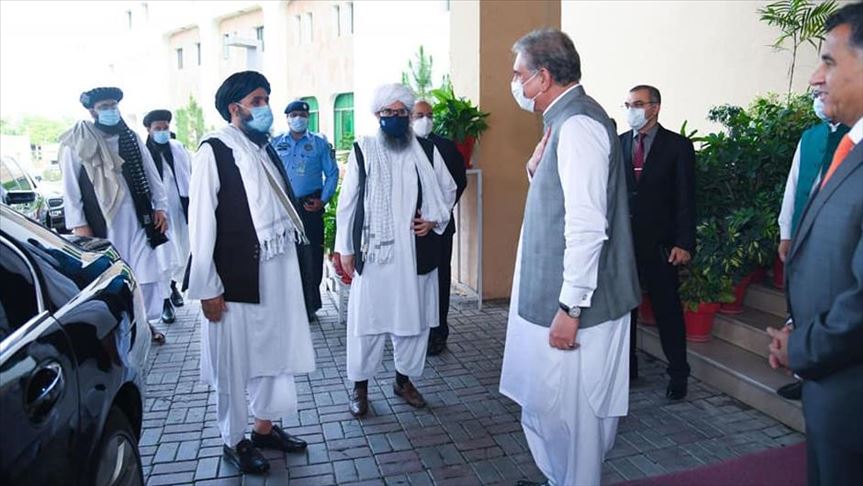Speaking in an interview with the website of the Strategic Council on Foreign Relations, Behrouz Ayaz referred to the impact of the developments in Afghanistan on Pakistan and said: One of the groups influenced by the Afghan Taliban is the Tehrik-i-Taliban Pakistan, better known as the Pakistani Taliban, and includes several groups.” Their dominated areas are in the northern states of Pakistan, home to more than 1.5 million Afghan refugees, and more than 4,000 members of the group have been fighting government forces to help the Taliban in eastern Afghanistan.
Pakistani Taliban modeling Afghan Taliban
The expert on Asia affairs, saying that the Tehrik-i-Taliban Pakistan (TTP) by modeling the example of the Afghan Taliban is trying to fulfill its demands, noted: The group’s leader, Noor Wali Mehsud, also seeks to follow the example of the Taliban, to the point that immediately after the Taliban’s victory in Afghanistan, he told the CNN ‘We hope to benefit from the Taliban victory in Afghanistan’.
Ayaz continued: Under such circumstances, the Taliban government will not directly and officially support the Pakistani Taliban, because the Taliban government acts in line with Pakistan and depends on its regional and international support and assistance. Explicit support for and assistance to the Pakistani Taliban will run counter to Islamabad’s demands.
He said that the release of Pakistani Taliban prisoners by the Taliban government, which was carried out under the pretext of releasing all prisoners, could have a great impact on the military strengthening of the Pakistani Taliban, adding: Given the Haqqani Network and al-Qaeda’s close ties with the Tehrik-i-Taliban Pakistan, the group is expected to receive indirect financial and intelligence support, not from a government position..
Increase in financial, intelligence support for Tehrik-i-Taliban
According to Ayaz, with the establishment of the Taliban government in Kabul, intelligence and financial support is expected from the Haqqani network, al-Qaeda and possibly the Indian government for the “Tehrik-i-Taliban” in northern Pakistan; because the al-Qaeda and the Haqqani network have close ideologies to the Pakistani Taliban, and see creation of areas controlled by the group in northern Pakistan as another success and creation of another base for their like-minded people, which in addition to spreading its ideology, will in some way lead to the repulse of the ISIS in the South Asian region.
He added that the Indian government, with the help of this group, is probably seeking to reduce Pakistan’s political power, create security and territorial integrity challenges, erode its military, and thus reduce its military power in developments and other sectors, especially in the issue of Kashmir.
Recalling the ethnic and ideological closeness of the Pakistani Taliban and the Afghan Taliban, the expert on Asia affairs considered strengthening each of the two as effective on the other and said: Although the Taliban today is different from the Taliban 20 years ago, it has not changed much ideologically and intellectually.
Ayaz considered acceptance of some international rules and regulations as a prerequisite for membership and gaining legitimacy in the international system and showing a positive image for the Taliban, adding: Extremist religious groups such as the Taliban and al-Qaeda are well aware of such issues and perhaps they consider legitimacy and establishment of the Taliban for their interests and a base for spreading their thoughts.
Regarding the possibility of a rift between the Pakistani Taliban and the Afghan Taliban due to the presence of the Afghan Taliban in power and the need to accept certain requirements in their functions, he said: The Tehrik-i-Taliban led by Noor Wali Mehsud, unlike previous leaders, has distanced itself from its ambitious jihadist goals of overthrowing the Pakistani government and focuses on the autonomy of the Pashtun areas of the Federally Administered Tribal Areas (FATA), or the northern border province, as its main goal. The group seeks to use the Afghan Taliban’s talks with the United States as a model for its recent talks with the Pakistani government; therefore, the possibility of a rift between the Taliban government in Afghanistan and the Tehrik-i-Taliban Pakistan due to the acceptance of international rules and regulations is out of the question.
The analyst of Asia affairs also expressed his opinion about the possibility of Pakistan using Afghanistan as a place to form proxy groups and said: Pakistan has always viewed foreign policy from the point of view of hostility to India, and has therefore long sought to keep Afghanistan obedient and subordinate to maintain depth of its strategy. The Army and the Inter-Services Intelligence (ISI) of Pakistan has always preferred religious Pashtuns to Afghan nationalists. The country, which has lost to India on other fronts, this time was able to win the game in Afghanistan and advance its interests.
Consequences of proxy war in Afghanistan against Pakistan
He stressed: Since Afghanistan as a “country of mosaic of ethnicities” has always been an arena for the play of the great powers, it is possible that other countries by choosing one of those ethnicities or groups on their behalf, compete for power to advance their interests in that country. The absence of the Tajiks, Uzbeks and Hazaras in the game of political power and their repression can inevitably lead those ethnicities to other great powers.
Ayaz considered the possible split of extremist religious people in Afghanistan over the division of power in the coming months and their role as proxy groups of foreign players and said: This situation could lead to the resumption of civil war in Afghanistan. The emergence of such possibility will lead to Pakistan’s support for the strong and powerful core of the Taliban, and this issue will make Pakistan internally unstable and fragile, and put it in isolation in the international arena.
Saying that any possibility of insecurity in Afghanistan would damage Pakistan’s international reputation, he said: Under such circumstances, Pakistan will move towards greater enmity with India, greater coldness and distance from the United States, and greater dependence on China. The widespread regional insecurity could also make Pakistan and Afghanistan “safe haven for the terrorists”.










0 Comments